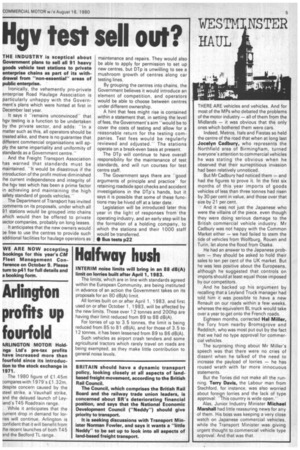Hgv test sell out?
Page 7

If you've noticed an error in this article please click here to report it so we can fix it.
THE INDUSTRY is sceptical about Government plans to sell all 91 heavy goods vehicle test stations to private enterprise chains as part of its withdrawal from "non-essential" areas of public enterprise.
Ironically, the vehemently pro-private enterprise Road Haulage Association is particularly unhappy with the Government's plans which were hinted at first in December last year.
It says it "remains unconvincedthat hgv testing is a function to be undertaken by the private sector, and adds: "In a matter such as this, all operators should be treated alike, and there is no guarantee that different commercial organisations will apply the same impartiality and uniformity of standards as a Government centre.
And the Freight Transport Association has warned that standards must be maintained. -It would be disastrous if the introduction of the profit motive diminished the current independence and integrity of the hgv test which has been a prime factor in achieving and maintaining the high safety standard of goods vehicles.'"
The Department of Transport has invited comments on its proposals, under which all 91 stations would be grouped into chains Nhich would then be offered to private sector companies, probably on long leases.
It anticipates that the new owners would De free to use the centres to provide such additional facilities for haulage operators as
maintenance and repairs. They would also be able to apply for permission to set up new centres, but DTp is unwilling to see a mushroom growth of centres along car testing lines.
By grouping the centres into chains, the Government believes it would introduce an element of competition, and operators would be able to choose between centres under different ownership.
A hint that fees might rise is contained within a statement that, in setting the level of fees, the Government's aim "would be to cover the costs of testing and allow for a reasonable return for the testing companies. Test fees would be regularly reviewed and adjusted.The stations operate on a break-even basis at present.
The Dip will continue to have overall responsibility for the maintenance of test standards, and will run courses for test centre staff.
The Government says there are "'good arguments of principle and practice" for retaining roadside spot checks and accident investigations in the DTp's hands, but it says it is possible that some of these functions may be hived off at a later date.
Legislation will be introduced later this year in the light: of responses from the operating industry, and an early step will be the formation of a holding company, to which the stations and their 1000 staff would be transferred.
• Bus tests p22












































































































